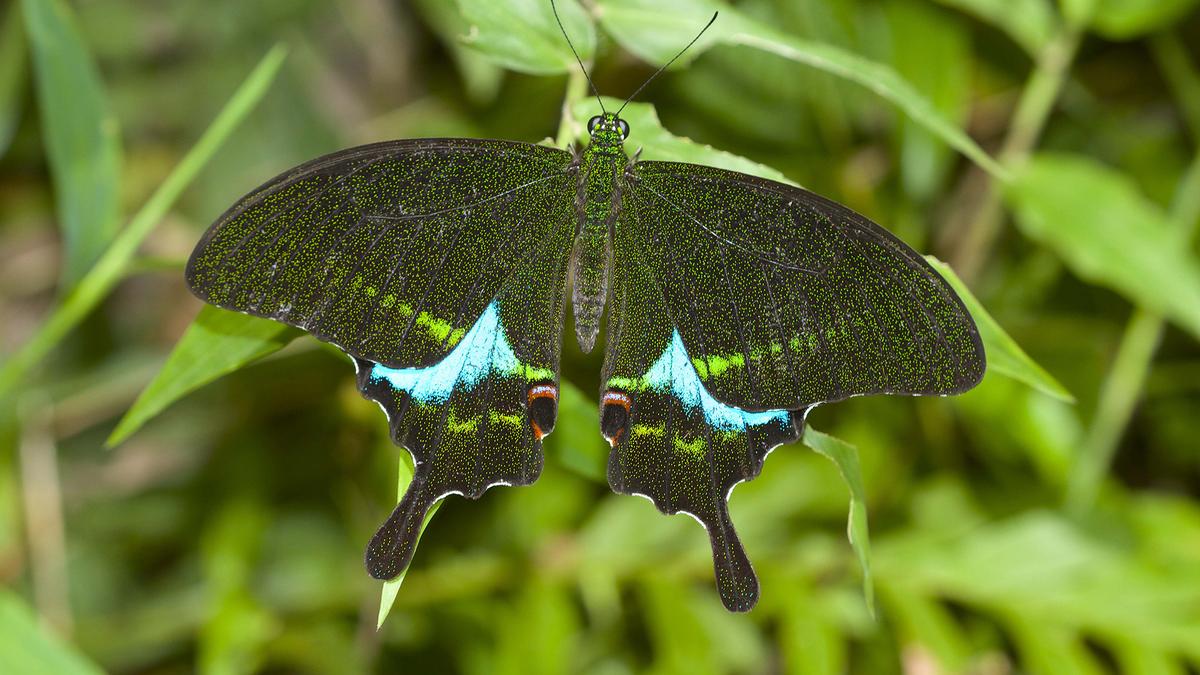Science
Nine New Species Discovered at Thattekad Bird Sanctuary in Kerala

A recent three-day faunal survey at the Thattekad Bird Sanctuary in Kerala has identified nine new species, enhancing its biodiversity profile. Conducted near Kothamangalam in Ernakulam, this study reaffirmed the sanctuary’s status as a vital ecological zone in the Western Ghats, known for its rich wildlife.
The survey was a collaborative effort between the Kerala Forest Department and the Travancore Nature History Society (TNHS). Nearly 30 experts from various fields participated, aided by forest staff and stationed at six survey camps to examine diverse habitats and elevation zones within the 25 square kilometer sanctuary. The multi-taxa approach encompassed various species, including butterflies, dragonflies, birds, and amphibians.
Significant Findings and Species Records
Among the findings, a total of 113 butterfly species were cataloged, featuring four new additions: the extra lascar, yellow jack sailor, yellow-breasted flat, and white-bar bushbrown. The survey also noted frequent sightings of the Buddha peacock, which is recognized as Kerala’s State butterfly, displaying egg-laying behavior. Other vibrant species like the Malabar rose, blue oakleaf, and southern birdwing contributed to the area’s diversity.
The odonate checklist expanded to 88 species, with five new records, including the Wayanad bowtail and the Malabar sprite. Additionally, large swarms of common picture wings and wandering gliders were observed alongside regional endemics such as Euphaea fraseri and Lyriothemis abrahami.
Birdwatchers would be pleased to learn that 104 bird species were documented during the survey, including raptors like the lesser fish eagle and the spot-bellied eagle owl. Other notable sightings included forest specialists such as the Malabar trogon, blue-eared kingfisher, and the endemic Malabar parakeet.
The survey teams also recorded a variety of other wildlife, including herds of elephants, gaur, and the elusive scaly anteater. Noteworthy sightings included the king cobra, eight fish species, 30 ant species, two freshwater crab species, 22 moth species, and five amphibians.
Implications for Conservation Efforts
G. Jayachandran, Wildlife Warden of the Idukki Wildlife Division, inaugurated the survey and emphasized the sanctuary’s critical role in conservation efforts. He stated, “Discoveries such as these remind us of the sanctuary’s irreplaceable role in conservation and research.” He also pointed out that the survey’s findings will provide vital insights for future conservation planning.
According to Kalesh Sadasivan, a research associate with TNHS, the survey underscores the importance of Thattekad as more than just a birding hotspot. “Thattekad is a living laboratory. The addition of new species records emphasizes the value of systematic surveys. Each documented species is crucial for understanding our ecosystems,” he remarked.
These findings not only enrich the scientific database but also serve as essential inputs for tracking ecosystem changes. They provide a means to assess population trends of threatened species and bolster the sanctuary’s reputation as a premier destination for nature enthusiasts worldwide.
-

 World5 months ago
World5 months agoSBI Announces QIP Floor Price at ₹811.05 Per Share
-

 Lifestyle5 months ago
Lifestyle5 months agoCept Unveils ₹3.1 Crore Urban Mobility Plan for Sustainable Growth
-

 Science4 months ago
Science4 months agoNew Blood Group Discovered in South Indian Woman at Rotary Centre
-

 World5 months ago
World5 months agoTorrential Rains Cause Flash Flooding in New York and New Jersey
-

 Top Stories5 months ago
Top Stories5 months agoKonkani Cultural Organisation to Host Pearl Jubilee in Abu Dhabi
-

 Sports4 months ago
Sports4 months agoBroad Advocates for Bowling Change Ahead of Final Test Against India
-

 Science5 months ago
Science5 months agoNothing Headphone 1 Review: A Bold Contender in Audio Design
-

 Top Stories5 months ago
Top Stories5 months agoAir India Crash Investigation Highlights Boeing Fuel Switch Concerns
-

 Business5 months ago
Business5 months agoIndian Stock Market Rebounds: Sensex and Nifty Rise After Four-Day Decline
-

 Sports4 months ago
Sports4 months agoCristian Totti Retires at 19: Pressure of Fame Takes Toll
-

 Politics5 months ago
Politics5 months agoAbandoned Doberman Finds New Home After Journey to Prague
-

 Top Stories5 months ago
Top Stories5 months agoPatna Bank Manager Abhishek Varun Found Dead in Well









